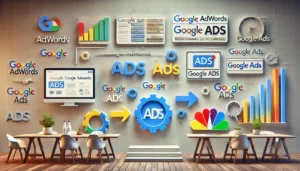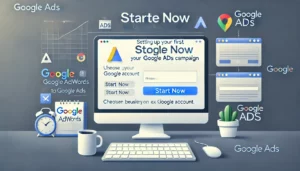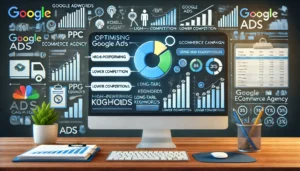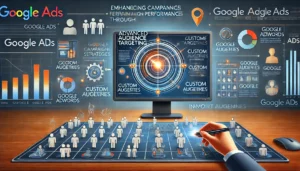Transitioning from Google AdWords to Google Ads: A Comprehensive Guide

Transitioning from Google AdWords to Google Ads marks a significant shift in digital marketing. This comprehensive guide is designed to help you navigate the changes, optimise your campaigns, and stay compliant with best practices. Whether you’re refining existing strategies or building a foundation for effective Google Ads management, the insights within will be a valuable asset in your journey towards digital marketing excellence in 2024 and beyond.
Key Takeaways
- Understand the historical context and reasons behind the transition from Google AdWords to Google Ads.
- Learn how to set up your first Google Ads campaign, including account creation, choosing the right campaign type, and setting your budget and bidding strategy.
- Discover optimisation techniques such as keyword research, ad creation, and performance monitoring to enhance your campaign’s effectiveness.
- Explore advanced strategies like audience targeting, conversion tracking, and remarketing to maximise your ROI.
- Stay informed about future trends in Google Ads, including emerging features, changes in user behaviour, and the integration of AI and automation.
Understanding the Transition from Google AdWords to Google Ads
Historical Context and Reasons for the Change
Google AdWords, now rebranded as Google Ads, has been a cornerstone of digital advertising for years. The transition was driven by the need to simplify the platform and make it more accessible to a broader range of advertisers. This rebranding reflects Google’s commitment to evolving with the digital landscape and providing more intuitive tools for campaign management.
Key Differences Between AdWords and Google Ads
While Google AdWords PPC focused primarily on keyword-based search advertising, Google Ads offers a more comprehensive suite of advertising options. These include display ads, video ads, app promotion, and more. The new platform also features a more user-friendly interface and advanced machine learning capabilities to optimise ad performance.
Benefits of the New Google Ads Platform
The new Google Ads platform brings several benefits to advertisers:
- Enhanced User Experience: The interface is more intuitive, making it easier for new users to navigate.
- Advanced Targeting Options: Improved audience targeting helps you reach the right people at the right time.
- Better Performance Tracking: Enhanced analytics and reporting tools provide deeper insights into campaign performance.
Transitioning to Google Ads allows you to leverage advanced features and tools that can significantly improve your advertising outcomes.
Setting Up Your First Google Ads Campaign
Creating a Google Ads Account
The first step to launching a successful campaign on Google Ads is creating an account. Navigate to the Google Ads homepage and click on Start Now. You can either use an existing Google account or create a new one. Follow the prompts to set up your account details and preferences.
Choosing the Right Campaign Type
Selecting the appropriate campaign type is crucial for achieving your marketing goals. Google Ads offers various campaign types, including Search, Display, Video, Shopping, and App campaigns. Evaluate your objectives and choose the campaign type that aligns best with your goals.
Setting Your Budget and Bidding Strategy
Once your campaign type is selected, it’s time to set your budget and bidding strategy. You can either use Google’s recommended budget options or enter a specific amount. Next, decide on a bidding strategy that suits your goals, whether it’s maximising clicks, conversions, or impressions. Proper budget management ensures that your ads run effectively without overspending.
Setting up your first Google Ads campaign may seem daunting, but with careful planning and execution, you can achieve remarkable results. Take your time to understand each step and make informed decisions.
Optimising Your Google Ads Campaign
Keyword Research and Selection
To maximise the effectiveness of your Google Ads campaign, start with thorough keyword research. Utilise tools like Google Keyword Planner to identify high-performing keywords relevant to your business. Focus on long-tail keywords as they often have lower competition and higher conversion rates. For instance, a PPC eCommerce agency might target specific product-related keywords to attract more qualified traffic.
Ad Creation and Extensions
Creating compelling ad copy is crucial for capturing your audience’s attention. Write clear, concise, and engaging headlines and descriptions. Use ad extensions to provide additional information and increase your ad’s visibility. Extensions like site links, callouts, and structured snippets can enhance your ad’s performance. Remember, a well-crafted ad can significantly improve your Quality Score, leading to better ad placements and lower costs.
Monitoring and Adjusting Campaign Performance
Regularly monitor your campaign’s performance to identify areas for improvement. Use Google Ads’ reporting tools to track key metrics such as click-through rates (CTR), conversion rates, and return on ad spend (ROAS). Make data-driven adjustments to your bids, keywords, and ad copy to optimise performance. A London PPC agency might find that certain local keywords perform better and adjust their strategy accordingly.
Continuous optimisation is key to staying ahead of the competition. Keep testing and refining your campaigns to achieve the best results.
By following these strategies, you can ensure your Google Ads campaigns are well-optimised, delivering maximum ROI for your business. Whether you’re working with a PPC agency or managing your campaigns in-house, these tips will help you get the most out of your advertising efforts.
Advanced Google Ads Strategies
Utilising Audience Targeting
Audience targeting is a powerful feature in Google Ads that allows you to reach specific groups of users based on their interests, behaviours, and demographics. By leveraging this tool, you can ensure your ads are shown to the most relevant audience, increasing the likelihood of conversions. Utilising audience targeting effectively can significantly enhance your campaign’s performance. Consider creating custom audiences based on your website visitors or using Google’s in-market audiences to target users who are actively searching for products or services similar to yours.
Implementing Conversion Tracking
Conversion tracking is essential for measuring the success of your Google Ads campaigns. It allows you to see which ads and keywords are driving the most valuable actions on your website, such as purchases or sign-ups. To set up conversion tracking, you’ll need to add a snippet of code to your website. This code will track user interactions and attribute them to your Google Ads campaigns. Accurate conversion tracking helps you make data-driven decisions and optimise your campaigns for better results.
Leveraging Remarketing Techniques
Remarketing is a strategy that involves targeting users who have previously interacted with your website or app. This technique can be highly effective in driving conversions, as it allows you to re-engage users who have already shown interest in your products or services. There are several types of remarketing strategies you can use, including standard remarketing, dynamic remarketing, and remarketing lists for search ads (RLSA). By implementing remarketing, you can keep your brand top-of-mind and encourage users to return and complete their purchase.
Remarketing can be a game-changer for eCommerce PPC campaigns, as it helps in converting window shoppers into actual buyers. By staying visible to potential customers, you increase the chances of them choosing your brand over competitors.
Incorporating these advanced strategies into your Google Ads campaigns can help you achieve better results and maximise your return on investment. Whether you’re working with a PPC ad agency or managing your campaigns in-house, these techniques are essential for staying competitive in the ever-evolving landscape of Google advertising.
Best Practices for Google Ads Compliance and Data Management
Understanding Google Ads Policies
Navigating Google Ads policies is crucial for maintaining a compliant and effective campaign. Familiarise yourself with Google’s advertising policies to avoid ad disapprovals and potential account suspensions. Regularly review updates to stay informed about any changes. This proactive approach ensures your ads meet all necessary guidelines, enhancing your PPC management efforts.
Managing User Data and Privacy
In the era of stringent data privacy regulations, managing user data responsibly is non-negotiable. Implement privacy-focused targeting methods and transparent data practices to comply with laws like GDPR. This not only ensures legal compliance but also builds trust with your audience. Remember, ethical data management is a cornerstone of successful PPC audit processes.
Ensuring Accurate Reporting and Analytics
Accurate reporting and analytics are vital for assessing the performance of your Google Ads campaigns. Utilise Google’s robust analytics tools to track key metrics and generate insightful reports. Regularly audit your data to ensure accuracy and make data-driven decisions. This practice not only optimises your campaigns but also supports effective PPC management.
By adopting these best practices, you can navigate the complexities of Google Ads compliance and data management, positioning your campaigns for long-term success.
Troubleshooting Common Google Ads Issues
When running Google Ads campaigns, encountering issues is inevitable. However, understanding how to troubleshoot these problems can significantly improve your campaign performance. Here are some common issues and how to address them effectively.
Future Trends in Google Ads
As we move further into 2024, it’s clear that Google Ads is evolving to meet the demands of a rapidly changing digital marketing landscape. These trends signify a broader transformation where efficiency, privacy, and personalisation are paramount. Agencies that can adapt to these changes and incorporate automation, data compliance, and audience-centric targeting into their Google Ads management practices will be better positioned to drive success for their clients.
Emerging Features and Tools
Google Ads continues to roll out new features and tools designed to enhance campaign performance and user experience. One of the most notable trends is the increased use of machine learning algorithms to optimise ad placements and bidding strategies. Advertisers who leverage these tools can expect improved ROI and more efficient use of their budgets. Additionally, new insights and controls for search partners are being introduced, addressing advertiser concerns and providing more transparency.
Adapting to Changes in User Behaviour
Understanding shifts in user behaviour is crucial for any successful Google Ads campaign. In 2024, there is a growing emphasis on mobile-first strategies and video content. With the top 20 video production companies listed for various ads and services, specialising in Google Ads and lead generation, it’s evident that video ads are becoming increasingly important. Podcasts and resources available for PPC management also highlight the need for continuous learning and adaptation.
Preparing for AI and Automation in Google Ads
Artificial Intelligence (AI) and automation are no longer just buzzwords; they are integral components of modern Google Ads strategies. By automating routine tasks such as keyword bidding and ad placements, advertisers can focus more on the creative and strategic aspects of their campaigns. This shift not only saves time but also enhances the overall effectiveness of ad campaigns.
The future of Google Ads is bright, with emerging technologies and strategies offering new opportunities for advertisers. Staying ahead of these trends will be key to maintaining a competitive edge in the digital marketing arena.
Conclusion
Transitioning from Google AdWords to Google Ads marks a significant step in enhancing your digital marketing strategies. This comprehensive guide has walked you through strategic planning, campaign optimisation techniques, and best practices for compliance and data management. Whether you are refining existing strategies or building a foundation for effective Google Ads management, the insights provided here will be invaluable. Remember, the key to a successful Google Ads campaign lies in continuous refinement and iteration. By leveraging the tools and techniques discussed, you are well on your way to achieving digital marketing excellence in 2024 and beyond. Happy advertising!
Frequently Asked Questions
Why did Google rebrand AdWords to Google Ads?
Google rebranded AdWords to Google Ads to simplify the branding and make it more inclusive of all the different types of ad campaigns they offer, including Search, Display, and Video.
What are the key differences between Google AdWords and Google Ads?
While the core functionality remains the same, Google Ads offers a more streamlined interface, additional campaign types, and enhanced machine learning capabilities compared to Google AdWords.
How do I set up my first Google Ads campaign?
To set up your first Google Ads campaign, you’ll need to create a Google Ads account, choose your campaign type, set your budget and bidding strategy, and create your ad content.
What are the benefits of using Google Ads over Google AdWords?
Google Ads offers improved user experience, more robust targeting options, and enhanced machine learning features that help optimise ad performance more effectively.
How can I optimise my Google Ads campaign?
You can optimise your Google Ads campaign through keyword research, creating compelling ad content, using ad extensions, and regularly monitoring and adjusting your campaign performance.
What should I do if my Google Ads are not performing well?
If your Google Ads are not performing well, identify and fix low-performance ads, resolve any disapproved ads, and address any budget or bidding issues to improve performance.
Author
Search Blog
Free PPC Audit
Subscribe to our Newsletter
The Voices of Our Success: Your Words, Our Pride
Don't just take our word for it. With over 100+ five-star reviews, we let our work-and our satisfied clients-speak for us.
"We have been working with PPC Geeks for around 6 months and have found Mark and the team to be very impressive. Having worked with a few companies in this and similar sectors, I rate PPC Geeks as the strongest I have come across. They have taken time to understand our business, our market and competitors and supported us to devise a strategy to generate business. I value the expertise Mark and his team provide and trust them to make the best recommendations for the long-term."
~ Just Go, Alasdair Anderson




